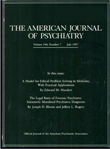The firewater myth and response to alcohol in Mission Indians
Abstract
OBJECTIVE: This study aimed to assess empirically the intensity of reaction to alcohol in a group of Native Americans. METHOD: Forty healthy, nonalcoholic Mission Indian men between the ages of 18 and 25 years were tested before and after ingestion of placebo and 0.75 ml/kg of alcohol. Subjective (self-report of feelings) and objective (blood pressure, pulse rate, and plasma cortisol level) measures of intoxication were taken before ingestion of alcohol and placebo and at 15, 30, 60, 90, and 120 minutes after ingestion. Overall effects of alcohol were evaluated, and the responses of subjects with less than 50% Native American heritage (N = 19) were compared with the responses of subjects with at least 50% Native American heritage (N = 21). RESULTS: Alcohol did not produce any significant effects on any of the objective measures of intoxication; however, the subjects reported significant subjective effects of alcohol. Subjects with at least 50% Native American heritage reported less intense effects of alcohol than did those with less than 50% Native American heritage, despite equivalent blood alcohol concentrations. CONCLUSIONS: These results contradict the "firewater myth"--the theory that Native Americans are more sensitive to the effects of alcohol. Rather, the data indicate that Mission Indian men generally may be less sensitive to alcohol's effects, a physiological characteristic that has been shown to be associated with a greater risk for alcoholism in Caucasian populations. In addition, individuals with a greater percentage of Native American heritage may be less sensitive to the subjective effects of alcohol than individuals with a smaller percentage of Native American heritage.



